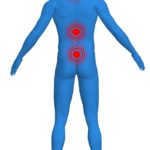January 23, 2012
By David Blyweiss, M.D.
In This Issue:
- The myth of anti-bacterial soap
- Why the FDA is reevaluating triclosan
- Read your labels to lower your risk
Are You Hand Washing Yourself Sick?
About ten years ago, we quietly waged a war against bacteria. We took a surgical scrub called triclosan that had been restricted to the hospital environment since 1972, and started adding it to everything from hand soap and body wash to children’s toys and paint products.
In the same timeframe, allergies have increased, antibiotics are less effective, and we have more resistant, deadlier strains of bacteria popping up that put your average germ to shame.
I’d say we’re losing this war. In fact, I’d say it’s a war we never should have started… and it’s time to fall back.
Open your arteries, improve blood flow for a new health miracle...
Did you know your circulatory system has over 60,000 miles of arteries, veins and other blood vessels, if stretched end to end?
But as you age, your blood vessels undergo changes, which may cause them to stiffen, thicken and get clogged.
GOOD NEWS! Doctors have now identified a “Miracle Molecule” inside your arteries that helps OPEN your arteries and IMPROVE blood flow.
It’s what Dr. Valentin Fuster calls it, "One of the most important discoveries in the history of cardiovascular medicine."To you, that means...
- Healthy blood pressure
- Sharper mind and memory
- Skyrocketing energy and muscular strength
- Increased pleasure and passion in the bedroom
- Improved circulation to every cell and organ in your body
Go here to discover a new natural way to significantly boost the levels of this miracle molecule in YOUR body NOW!
Is hand washing still an important way to protect yourself against cold and flu? Absolutely! But is it necessary to use anti-bacterial soap when you do? Absolutely not!
Instead, go through all of your soaps, body washes, and even toothpaste and mouthwash, and read the labels. If it contains triclosan, I suggest you dump it. Here’s why…
For starters, all bacteria are not bad. If they were, we would all be dead. The human race would be extinct. And most of the earth would be unviable.
We have a symbiotic relationship with bacteria – one that does much more good than harm. In our body alone, bacteria cells outnumber human cells 10-to-1. Our entire digestive tract is lined with bacteria. Without it, we can’t break down food, extract the vitamins and minerals from what we eat, or get rid of waste.
The same is true of our skin. We have a universe of harmless bacteria covering our skin. Contrary to popular belief, this is what protects us from the harmful bacteria and viruses that make us sick.
Just like chemotherapy can’t discern cancer cells from healthy cells and kills all cells indiscriminately, anti-bacterial soap destroys all bacteria. Even the good stuff keeping you healthy and building your immune system.
So, when you are washing with anti-bacterial soap, you are undermining your body’s natural mechanism for warding off disease. You are literally participating in making yourself sick.
The World's Quickest Solution for Ending Prostate and Urinary Misery
This has recently been revealed to be one of the only real breakthroughs in prostate health.
The seeds of a strange fruit (sometimes called "Chinese Apples") hold powerful phytonutrients that are a revolution in prostate health.
In fact, UCLA and Veterans Administration research have now proved this to be true.
Not only that, but it may be the worlds quickest solution for ending prostate misery.
Simply stated, these phytonutrients represent a huge step beyond beta sitosterol, saw palmetto, and other phytosterols alone.
Simply click HERE if you want to have fast prostate relief...restful, uninterrupted sleep...no more constant "urges to go"...enhanced virility...and optimal prostate support for life.
Not exactly what the marketers want you to think when they run ads for anti-bacterial everything during cold and flu season.
But the impact of having triclosan in so many products is a little more frightening. So frightening that the FDA is considering taking it off the market. Or at least restricting its use – right now. And many European countries have already issued bans and restrictions. A few companies have gone so far as stop using triclosan voluntarily, before they look bad by being forced to do so.
Think about it. You know it has to be big when the FDA is willing to step in, despite the economic impact it could have on the many companies peddling triclosan. What’s really happening when we overuse triclosan?
Here’s the big deal…
Where does all the triclosan go? Down the drain, of course. And into the water supply. When water is treated, chlorine is added. If you combine chlorine and triclosan – and add sunlight – you could be creating highly carcinogenic dioxins. Big, big problem.
Triclosan is also having an impact on fish and other wildlife. While studies are still underway, researchers suspect it may disrupt the endocrine system, cause damage to cells, and affect the DNA of marine life.
And that’s before they’ve had a chance to study whether it is having the same impact on humans.
Personally, I’m not waiting around, and I don’t think you should, either. The place to start is to remove products containing triclosan from your own home…and it wouldn’t hurt to let your friends and family in on the problem while you’re at it. Use this link to forward this article, and scroll down for some specific tips on getting rid of as much triclosan exposure as possible…
You might be surprised at how many products contain triclosan, also marketed under the brand names BioFresh® and Microban®. While some manufacturers are already removing it from products, the list is still quite long.
Beyond Pesticides, a watchdog group monitoring the pesticide industry, created a fact sheet that includes many brands to watch for. This list is a bit outdated, but it’s a good place to start.
The good news is manufacturers are required to post triclosan on the label, so you can scour your home and readily identify what needs to go and what can stay.
If you do need have a circumstance where you feel you need an anti-bacterial cleaner, try natural products, such as:
- tea tree oil
- pine oil
- eucalyptus
- hydrogen peroxide (for skin)
- vinegar
- lemon juice
- baking soda
Like most topics we cover in Advanced Natural Wellness, you’ll find nature gives us what we need to tackle germs and stay healthy. And the more of us who use natural products that support our health, in place of chemicals that undermine our health, the better off we’ll all be.
Resources:
Udoji F, et. al. Immunosuppressive effects of triclosan, nonylphenol, and DDT on human natural killer cells in vitro. J Immunotoxicol. 2010 Jul-Sep;7(3):205-12.
Hernández A, et al. The binding of triclosan to SmeT, the repressor of the multidrug efflux pump SmeDEF, induces antibiotic resistance in Stenotrophomonas maltophilia. PLoS Pathlog. 2011 Jun;7(6):e1002103. Epub 2011 Jun 30.
Bedoux G, et. al. Occurrence and toxicity of antimicrobial triclosan and by-products in the environment. Environ Sci Pollut Res Int. 2011 Nov 5. [Epub ahead of print]
Miller, T.L., et. al. The acute toxicity of penta-, hexa-, and heptachlorohydroxydiphenyl ethers in mice. Journal of Toxicology and Environmental Health 12 (2-3):245-53, 1983.






